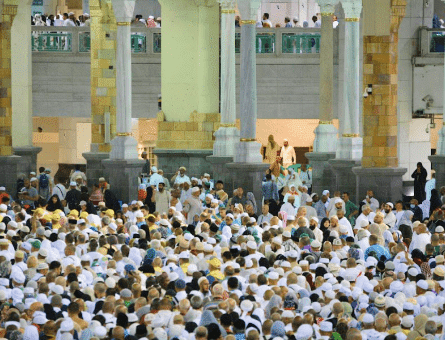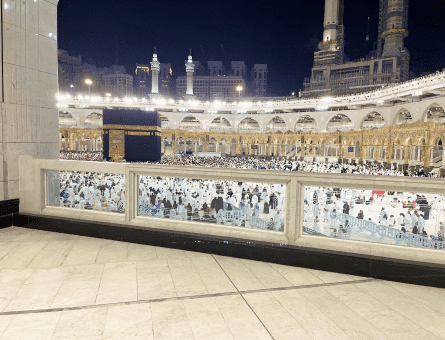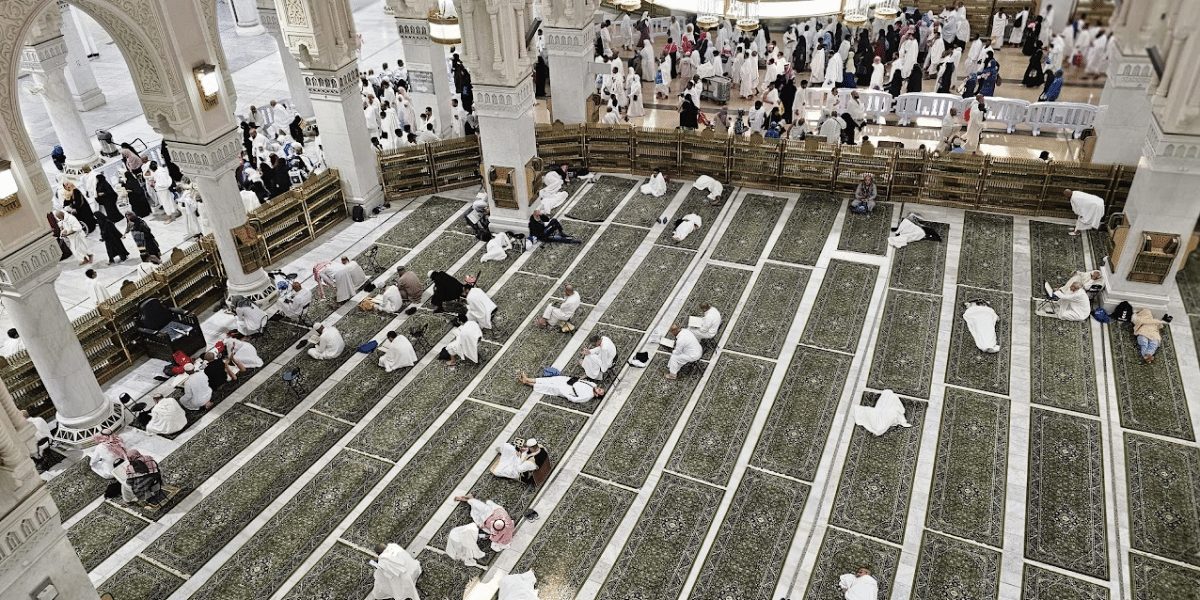Takbir Al Tashreeq – Recited After Every Fardh Salah During Hajj
Allah S.W.T. in Surah Baqarah Verse 185 tells all Muslims:
“The month of Ramadhan [is that] in which was revealed the Qur’an, a guidance for the people and clear proofs of guidance and criterion. So whoever sights [the new moon of] the month, let him fast it; and whoever is ill or on a journey – then an equal number of other days. Allah intends for you ease and does not intend for you hardship and [wants] for you to complete the period and to glorify Allah for that [to] which he has guided you, and perhaps you will be grateful.” [Holy Quran, Surah Baqarah Verse 185]
As Muslims, it is our duty to glorify the greatness of Allah SWT, and the best way to do this is by reciting Takbeer: “Allahu Akbar,” which means “Allah is the greatest.” However, during Hajj, pilgrims recite a special Takbeer that is called Takbir al Tashreeq. Here is everything you need to know about Takbir al Tashreeq and its significance in Islam.
What Is Takbir Al Tashreeq?
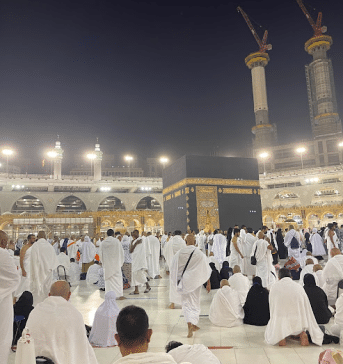 Takbir al Tashreeq is the prayer recited by pilgrims after every Fardh Salah during Hajj. According to Islamic scriptures, when Prophet Ibrahim (AS) began to sacrifice his beloved son, Ismail (AS), the angels sent by Allah with a ram exclaimed, “Allahu akbar, Allahu akbar (Allah is the greatest, Allah is the greatest).”
Takbir al Tashreeq is the prayer recited by pilgrims after every Fardh Salah during Hajj. According to Islamic scriptures, when Prophet Ibrahim (AS) began to sacrifice his beloved son, Ismail (AS), the angels sent by Allah with a ram exclaimed, “Allahu akbar, Allahu akbar (Allah is the greatest, Allah is the greatest).”
Prophet Ibrahim (AS) heard the voice of the angels and replied, “La illah illa Allahu Wallahu akbar (There is no god besides Allah, and Allah is the greatest).”
The moment his son, Prophet Ismail (AS) heard the conversation, he understood that Allah SWT had shown mercy, relieving him and his father from the great trial. Prophet Ismail (AS) replied, “Allahu Akbar Walillahil hamd (Allah is the greatest, and to Allah belongs all praise).” (Ibid)
Ibn’ Umar (R.A.) narrated that he used to come to the prayer place on the morning of the day of Eid al-Fitr when the sun had risen, and he would recite Takbeer until he reached the prayer place, then he would recite Takbeer in the prayer place until the imam sat down and stopped reciting Takbeer.
Is Takbir Obligatory?
Prophet Muhammad (PBUH) said, “The key to prayer is purification, its opening is to say Allaahu Akbar, and its closing is to say al-salaamu’ alaykum.” (Abu Dawood, Ahmad, Ibn Maajah, and al-Tirmidhi)
Shaykh-ul-Islam Ibn Taymiyyah (R.A.) said in Majmoo’ Al-Fataawa: “The most correct view about Takbeer, the opinion of the majority of scholars of the Salaf and the jurists from among the Companions and the Imaams (prominent scholars), is that one should utter the Takbeer starting from the Fajr prayer on the day of ‘Arafah until the end of the days of Tashreeq after every obligatory prayer, and it is permissible for every person to utter the Takbeer loudly when going out to the ‘EId prayer; this is indeed according to the agreement of the four Imaams (i.e., the Imaams of the Four Schools of jurisprudence).”
Takbir is an essential part of prayer, and so if a person deliberately or mistakenly omits Takbir, then their prayer doesn’t count. Shaykh Ibn’ Uthaymeen (may Allah have mercy on him) was asked: “If a person omits the opening Takbir by mistake, what is the ruling?” He replied: “If a worshipper omits the opening Takbir, by mistake or deliberately, his prayer does not count because the prayer cannot begin without the opening Takbir. If we assume that a person stands in the row and then starts with the opening dua and recitation of al-Faatihah, and he continues with the prayer, we say that has not entered prayer in the first place, even if he performs all the rak’ahs.” (Fataawa al-Shaykh, 14/36)
When Should Takbir Be Recited During Hajj?
The Messenger (PBUH) of Allah SWT has instructed the Muslim Ummah to commence the recitation of Takbir al Tashreeq right after the Fardh of Fajr prayers on the day of Arafah, 9th Dhul Hijjah.
Note that the recitation of Takbir al Tashreeq should then be continued all the way till the Asr prayer on the 13th Dhul Hijjah. This means that Takbir al Tashreeq is to be recited after a total of 23 prayers during the annual pilgrimage (Hajj).
Takbir Al Tashreeq in Arabic
Takbir al Tashreeq is the recitation of the following:
اللَّهُ أَكْبَرُ اللَّهُ أَكْبَرُ لَا إلَهَ إلَّا اللَّهُ وَاَللَّهُ أَكْبَرُ اللَّهُ أَكْبَرُ وَلِلَّهِ الْحَمْد
Takbir Al Tashreeq in English
Transliteration: Allahu Akbar, Allahu Akbar, La Ilaha Ilallahu Wallahu Akbar, Allahu Akbar, Wa Lillahil Hamd.
Translation: Allah is the greatest, Allah is the greatest. There is no deity besides Allah, and Allah is the greatest. Allah is the greatest, and all praises are for Allah only.
There is also a longer version of Takbir al Tashreeq that you can recite during Eid:
Transliteration: Allahu Akbar, Allahu Akbar, Allahu Akbar, La illaha il Allah, Allahu Akbar, Allahu Akbar, Walilahil Hamd, Allahu akbar kabira, Walhamdulillahi kathira, Wa subhan allahi, Bukratan wa asila, La illaha il Allah, Sadaqa wa’dah, Wa nasara abda, Wa a’azza jundahu Wa hazamal-ahzaaba wahdah La illaha il Allah Wa laa na’budu illa iyyah Mukhlessena lahud-deena Walau karihal-Kafirun Allahumma salli ala Sayyidina Muhammad, Wa ala aali Sayyidina Muhammad Wa ala as-haabie Sayyidina Muhammad, Wa ala ansari Sayyidina Muhammad, Wa ala azwajie Sayyidina Muhammad Wa ala dhurreyatie Sayyidina Muhammad Wa ala dhurreyatie Sayyidina Muhammad Wa sallim tasleeman katheera.
Translation: Allah is Great, Allah is Great, Allah is Great, there is no God, but Allah, Allah is Great, Allah is Great, to Him belongs all Praise, Allah is the Greatest, And all Praise is due to Him, And Glory to Allah eventide and in the morning, there is no God, but Allah the Unique, He has fulfilled His Promise and made Victorious His servant and made Mighty His soldiers and defeated the confederates there is no God, But Allah He alone we worship with sincere and exclusive devotion even though the idolaters hate it, O Allah, have Mercy on our Prophet Muhammad and on the family of our Prophet Muhammad and on the companions of our Prophet Muhammad and on the helpers of our Prophet Muhammad and on the wives of our Prophet Muhammad and on the progeny of our Prophet Muhammad and Bestow upon them much peace.
How Do You Recite Takbir?
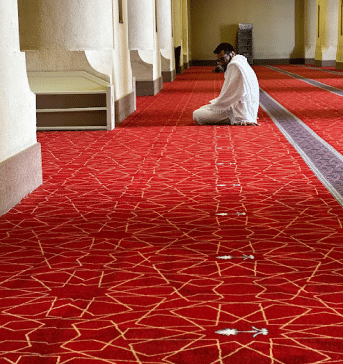 According to the majority of Islamic scholars, the recitation of Takbir al Tashreeq is a Sunnah for both women and men, whether they are in their homes, in the marketplace, or inside the mosque.
According to the majority of Islamic scholars, the recitation of Takbir al Tashreeq is a Sunnah for both women and men, whether they are in their homes, in the marketplace, or inside the mosque.
While men are directed to say Takbir al Tashreeq out loud, women should recite it quietly or in their hearts only as Allah SWT has commanded women to lower their voices. Prophet Muhammad (PBUH) said, “If you notice something during the prayer, men should say ‘Subhan-Allaah!’ and women should clap.”
How Many Times Do I Need to Recite It?
Hajj and Umrah pilgrims are instructed to recite Takbir al Tashreeq once after each of the Fardh from the Fajr prayer time on the 9th of Dhul Hijjah till the Asr prayer on the 13th of Dhul Hijjah.
In case you want to recite Takbir al Tashreeq more than once, there is no restriction in doing so.
Is Takbir al Tashreeq Wajib?
Recitation of the Takbir al Tashreeq is indeed Wajib (incumbent) upon every pilgrim (male and female).
Takbir al Tashreeq should be recited after every Fardh Salah performed individually or in congregation from the Fajr prayer on the 9th of Dhul Hijjah till the Asr prayer on the 13th of Dhul Hijjah. (Multaqal Abhur, Majma’ul Anhur & ad-Durrul Muntaqa, Vol: 1, Pg: 259-260, D.K.I)
Summary – Takbir Al Tashreeq
It is necessary to recite Takbir al Tashreeq after the Fajr prayer on the 9th of Dhul Hijjah till the completion of the Asr prayer on the 10th of Dhul Hijjah. The recitation of Takbir al Tashreeq is wajib for both men and women.
While women should recite it softly, men should recite Takbir al Tashreeq out loud.
Explore The New Pilgrim App
The Ultimate App
for Hajj and Umrah!









